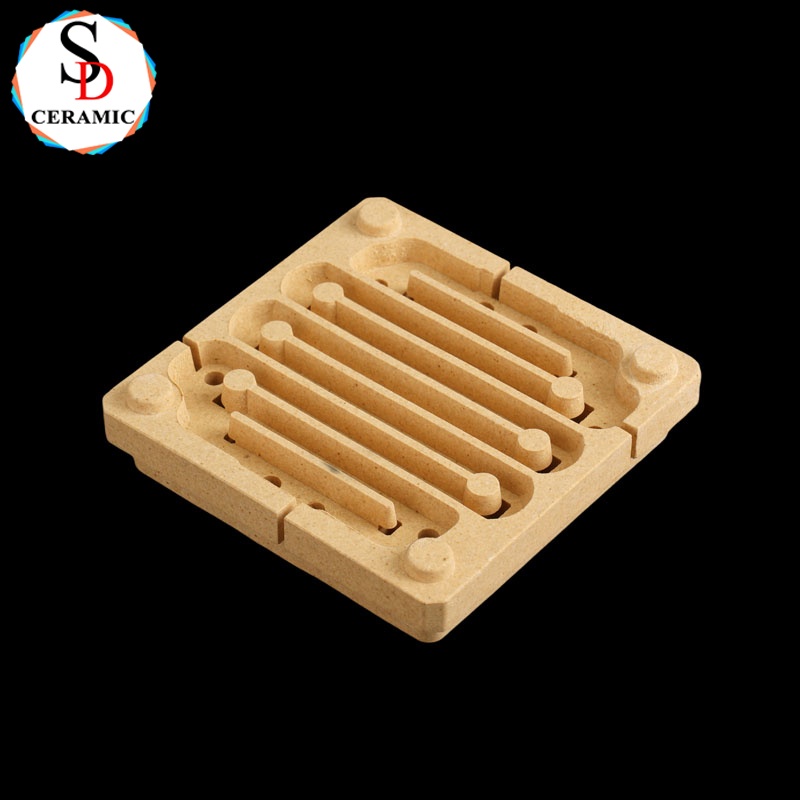Cordierite ceramic (2MgO·2Al₂O₃·5SiO₂) is a unique low expansion engineering ceramic known for its ultra-low thermal expansion coefficient, excellent thermal shock resistance, and outstanding dielectric properties. This material is widely used in the fields of automotive catalytic carriers, electronic packaging, and high-temperature filtration.
About Cordierite Ceramic
Cordierite ceramics are composed of a ternary system of magnesium oxide (MgO), aluminum oxide (Al₂O₃), and silicon dioxide (SiO₂), with a honeycomb like porous structure that endows it with extremely low thermal expansion, high porosity, and good thermal insulation properties.
According to application requirements, it can be divided into:
Dense cordierite (porosity<5%): used for electronic substrates and precision components.
Porous cordierite (porosity 20-50%): suitable for catalytic carriers and filtration devices.
Characteristics of cordierite ceramics
physical property
Color: Light gray to blue (due to trace iron and titanium impurities)
Density: 2.0-2.6 g/cm³ (30% lighter than alumina)
Thermal expansion coefficient (25-800°C): 1.5-2.5 × 10⁻⁶/K (lowest among all ceramics)
Mechanical properties
Bending strength: 50-120 MPa (lower for porous types)
Hardness: 7-8 Mohs
Elastic modulus: 80-120 GPa
Thermal Properties
Maximum operating temperature: 1350°C (short-term up to 1450°C)
Thermal conductivity: 1-3 W/(m · K) (excellent thermal insulation)
Electrical Property
Volume resistivity (20°C):>10 ΩΩ· cm
Dielectric constant (1MHz): 4-5 (ideal for high-frequency applications)
|
|
Advantages of cordierite ceramics
✔ Ultimate thermal shock resistance - able to withstand rapid cooling and heating with Δ T>1000°C
✔ Ultra low thermal expansion - close to zero expansion (matched with quartz glass)
✔ Lightweight porous - high porosity (adjustable to 50%) while maintaining structural strength
✔ Chemical inertness - resistant to weak acid/alkali corrosion (excluding HF)
✔ Cost effectiveness - More economical than silicon carbide/zirconia
Typical applications of cordierite ceramics
Automotive Environmental Protection: Diesel Particulate Filter (DPF), Three way Catalytic Carrier (Honeycomb Structure)
Electronics industry: 5G antenna substrate, microwave dielectric components
High temperature filtration: molten metal filter plate, industrial waste gas treatment
Thermal equipment: heat exchangers, low-temperature kiln furniture (<1300°C)
Aerospace field: satellite antenna cover (low dielectric loss)
conclusion
Cordierite ceramic is a benchmark material for ultra-low expansion and high-frequency electronic applications, and its honeycomb structure design is irreplaceable in the field of automotive exhaust treatment. For scenarios that require extreme thermal cycling stability (such as DPF filters) or high-frequency signal transmission (such as 5G base stations), cordierite provides the best cost-effective solution.
Customized service: Supports customization of honeycomb cell density (100-900 CPSI), aperture (0.1-5mm), and size, and provides material performance testing reports!

If you have any questions or need help, feel free to contact with our team.
Phone
+86 183 5248 9056
Location
Qianluo Village, Dingshu Town, Yixing City, Jiangsu Province, China
Welcome to subscribe to our email message!


Copyright © Yixing Shengda Refractory Ceramic Co., Ltd. All Rights Reserved | Sitemap | Powered By 